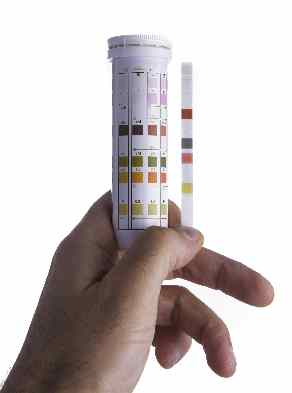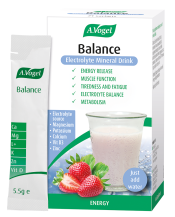What is a pH balance?
The term pH is simply an abbreviation of ‘the power of hydrogen,’ and refers to the concentration of hydrogen ion in your body. A normal pH scale ranges from 1 to 14 with 7 considered to be neutral. If you have a pH balance lower than 7 then you are said to be ‘acidic’ whereas if your pH balance is over 7, you are ‘alkaline'.
As a human being, the pH of your blood should naturally be slightly alkaline – around 7.30-7.45 on the pH scale. Anything above or below that mark is either too acidic or too alkaline and often almost every area of your body will suffer as a consequence.
Electrolytes and your pH
Electrolytes are small, charged particles that your body needs to function, usually composed of key minerals such as calcium, magnesium, potassium and sodium. They work within your body to help regulate your fluid balance, support your muscle function and generate electrical impulses.
If your blood is too acidic it can start to steal these minerals from other parts of your body – for example it can take calcium from your bones, causing you to experience all sorts of problems relating to your bones and joints.
The correct balance of electrolytes can help to combat acidity which is why it is important to try and maintain a healthy intake.
What happens if your pH becomes too acidic?
We have ‘buffer systems’ in our body which are working hard to help keep us in perfect pH balance.
Unfortunately, as a result of modern day lifestyles, our buffer systems often struggle to keep up with the demands of neutralising all of these excess acids! Over time we can end up with excess acidity in our blood which then leads to excess acidity harbouring in our bodily tissues.
This state is known as ‘hyperacidity’.
Diet is usually to blame, although other explanations such as alcohol abuse, antibiotics, stress and too much or too little exercise can also play a role. Foods such as sugar, grains, dairy products, processed foods and fresh meats are all very acidic and too much can cause a pH imbalance in your stomach – think, for example, when you experience acid reflux, but also on your body as a whole when these foods are metabolised.
Is acidity always bad?
Your body is naturally composed of areas that should be acidic and areas that should alkaline – for example, your stomach needs to be slightly acidic in order to breakdown foods while your small intestine should be more alkaline, helping to neutralise the acid from your body.
Believe it or not a more alkalinised pH helps the parts of your body that are supposed tobe acidic, remain that way. The colon for example, has to stay acidic for lactose fermenting friendly bacteria to thrive. If your pH becomes too acidic, this unfriendly bacterium will start to dominate this environment leading to all sorts of issues.1
A pH imbalance can have effects throughout the entire body - below are just a few of the key areas!
- Digestive system: I have already touched upon one digestive symptom, acid reflux, but in reality indigestion, nausea and bloating can all be caused by too much or too little acid. Eventually your ability to absorb nutrients from your food will be compromised and your pancreas will become too exhausted to function properly, resulting in inflammation and extreme discomfort
- Immune system: Over 70% of your immune cells are in your gut so this can spell bad news for your immune system, which will already be weakened anyway if your body has to pull alkalising nutrients such as calcium from your other cells. A weak immune system means that you will become more susceptible to colds and flus, leaving you vulnerable to viruses
- Nervous system: Since in hyperacidity your body is pulling essential alkalising nutrients from different areas, you will start to feel fatigued and deprived of energy which can have a knock-on effect on your moods, making you more prone to mood swings
- Muscles and joints: I’ve mentioned calcium numerous times so far and I’m pretty sure you can imagine what happens to your bones without this crucial mineral. However acid can also start to accumulate in your joints, damaging cartilage and leading to inflammatory conditions such as arthritis!
- Skin: Hyperacidity can cause you to break out in pimples and blemishes. This is because when your pH level is out of balance, inflammation can occur and your skin will gradually become weaker and less able to fight off infections or free-radical damage, leading to premature ageing.
1http://www.capesouth.co.nz/wellbeing/influence-acidity-bowel-flora
What happens if your pH becomes too alkalinised?
Okay, so I’ve explained to you what happens if your pH becomes too acidic but that then begs the question – can it become too alkalinised?
The short answer is yes but this is much less common than hyperacidity. When your alkaline levels are too high it can lead to a condition known as alkalosis which boasts quite a few symptoms, including light-headedness, involuntary muscle spasms and nausea.2
This condition is very rare though and normally occurs when the body loses too much acid, which is known as metabolic alkalosis. This can happen due to vomiting or diarrhoea as you tend to lose a lot of fluids and electrolytes, affecting your kidneys ability to maintain a normal blood pH.3
2http://www.livestrong.com/article/154113-symptoms-that-the-body-is-too-alkaline/
3http://www.msdmanuals.com/en-gb/home/hormonal-and-metabolic-disorders/acid-base-balance/alkalosis
How can you tell if your pH is imbalanced?
If you’re concerned about your pH balance I’d recommend visiting your local pharmacy. They should stock pH test strips that you can use to check your pH levels.
 Most tests usually require a sample of urine or saliva which can help to give an indication of your overall pH balance. If you decide to test your urine, it would be best to collect a small sample of your first bladder movement. Remember though, your pH levels can fluctuate throughout the day so anywhere between 6 to 6.5 early in the morning is considered normal.
Most tests usually require a sample of urine or saliva which can help to give an indication of your overall pH balance. If you decide to test your urine, it would be best to collect a small sample of your first bladder movement. Remember though, your pH levels can fluctuate throughout the day so anywhere between 6 to 6.5 early in the morning is considered normal.
At night your urine may be slightly more alkaline, somewhere between 6.5 and 7.
If you decide to test your saliva instead, do so before brushing your teeth first thing in the morning. Again your pH levels can rise and fall throughout the day but for your saliva, anywhere between 7 and 7.4 is normal.4
4http://www.chatelaine.com/health/diet/tired-overweight-you-might-be-too-acidic/
How do you maintain a healthy pH balance?
So here’s the real question that you’re probably asking – how do you maintain an overall healthy pH balance? Well a number of factors can contribute towards a healthy pH – your diet, how much water you drink, a good probiotic and getting plenty of rest can go a long way towards improving your pH, making sure it isn’t too acidic or alkaline.
You are what you eat
The most obvious culprit when it comes to your pH balance is your diet. As I mentioned earlier, if your diet is too high in acidic foods it will lower your pH so try to avoid refined sugars, processed foods and alcohol.
However, cutting out the rubbish sometimes isn’t enough and you’d be surprised to learn that some healthy foods can also become acidic as they are broken down – beef, some nuts, fish, eggs, oats and even plums are all slightly acidic whilst citrus fruits such as limes and lemons surprisingly have an alkalising effect, making it difficult to know where to draw the line.
My advice would be to stick to fresh vegetables – mushrooms, sauerkraut and cabbage all contain low acid levels although if these are too bland you’ll be pleased to learn that most herbs are also low acid as well as potatoes, carrots, figs, pears, melons, unsweetened yoghurt and lentils. Healthy fats like avocados, and some seeds should also be on your menu alongside potassium-rich bananas!
Try to incorporate some green tea into your diet too as it is a refreshing and tasty beverage that’s rich in antioxidants!
Go organic and GMO-Free
As I’ve just mentioned, fresh is usually best but you should try and take this a step further by going organic. Believe it or not, industrial farming and exposure to pesticides can make food more acidic which is why I’d definitely opt for cutting these out from your diet completely!
Take a probiotic/prebiotic
Taking a probiotic can help to introduce more friendly bacteria into your gut, creating a balance that prevents the spread of unfriendly bacteria and helps to lower your pH levels. Probiotics that contain lactobacillus are particularly useful as they are more likely to survive in highly acidic environments and can help to produce lactic acid to metabolise glucose.5
However, probiotics, although useful, are still very delicate and stomach acid can kill them very effectively. I would advise taking a good prebiotic daily with your probiotic to really maximise its potential.
Prebiotics help to nourish your friendly bacteria, creating an environment which they can thrive in, encouraging their long-term survival. They also cope better in acidic gut environments! Our prebiotic Molkosan is prepared using whey and is naturally rich in L+ lactic acid, helping to improve your internal gut environment, allowing the friendly bacteria in your gut to thrive!
5 http://www.newsmax.com/FastFeatures/probiotics-pH-balance-gut/2015/12/09/id/705173/
Get plenty of rest and relaxation
Rest and relaxation is very important in any scenario but when it comes to your pH levels, stress in particular is a big NO-NO! This is because stress can have an acidic affect upon your body, stimulating the release of inflammatory chemicals and hormones as part of your innate ‘fight or flight’ response. Together with an already overly acidic environment, thesecan easily bring on a number of symptoms, including headaches and an increased heart rate.
Not to mention that stress hormones such as cortisol instinctively make you crave carbohydrates and sugar foods that are usually highly acidic!
So getting plenty of rest is essential – make sure you set aside some time out of your day for yourself, whether it’s half an hour reading your favourite book or enjoying a soak in the bath. Make sure you keep to a nutrient-rich diet and avoid caffeine, which can stimulate your nervous system and interrupt your sleep cycle!
Try our Balance Drink
I’ve already touched upon the connection between your pH levels and electrolytes which is why I’d recommend trying our Balance Mineral Drink.
Lactose and gluten-free, this drink is naturally rich in zinc, potassium, calcium and vitamin D, as well as L+lactic acid, helping to contribute towards regulating and balancing your pH. Simply mix one sachet with a little water to produce a lovely fruity drink that tastes slightly similar to a strawberry milkshake.
Our Balance Mineral Drink is also a good option for keeping you hydrated and could be useful to incorporate into your work-out routine either as a post or pre-workout drink to boost your levels of electrolytes!







 Hello. My name is Alison Cullen and I am an experienced nutritional therapist with a clinic in Ayrshire, Scotland. I currently combine running my clinic with the role of Education Manager for A Vogel. I lecture, train and write extensively on health issues, which I find endlessly fascinating.
Hello. My name is Alison Cullen and I am an experienced nutritional therapist with a clinic in Ayrshire, Scotland. I currently combine running my clinic with the role of Education Manager for A Vogel. I lecture, train and write extensively on health issues, which I find endlessly fascinating.
